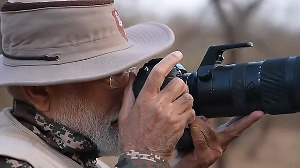By creating mayhem, Hamas aims to force the Arab States to give up their plans of reconciliation with Israel, explains Colonel Anil A Athale.

Almost 50 years to the dot, the Middle East and its associated Palestine crisis are again at the centre of world affairs. It is easy to say that history repeats itself, although in a different avatar.
The 1973 Yom Kippur War is widely regarded as a watershed moment in world history. It seems Hamas's surprise attack on Israel on October 7, 2023 threatens to be a similar inflection point. The current crisis has all the makings of a wider Middle East or even a global crisis unless saner counsels prevail on both sides.
It should not be forgotten that the Yom Kippur War of 1973 saw both the superpowers, the US and the Soviet Union, put their nuclear weapons on alert. After the Cuban Missile Crisis of 1962, this was the closest that the world came to staring at a nuclear conflagration and World War III.
The current Hamas-initiated attack has set the Arab street aflame and threatened instability in many moderate Arab States. Unlike the 1973 war, this time around, Iran, a non-Arab State, is also involved, giving it a Islam versus the rest colour to the war.
The 1973 Yom Kippur war was a consequence of the comprehensive Israeli victory in the Six Day War (June 6, 1967-June 12, 1967).
In that war, preceded by a surprise preemptive air attack Israel decimated Egypt, Syria, and Jordan's militaries. It conquered the Sinai Peninsula and reached the East Bank of the Suez Canal.
In the north, it captured the Golan Heights and on the Jordanian front captured East Jerusalem and West Bank territories.
In 1973, Egypt launched a daylight attack on the Bar Lev Line under the protection of a Soviet-supplied anti-aircraft missile shield and routed the Israeli army. It was the first time since 1948 -- when the State of Israel was formed -- that the Arabs had seen military success.
In the earlier three wars -- 1948, 1956 and 1967 -- Israel had defeated the combined Arab armies and established its military domination in the region.
The 1973 Yom Kippur War restored the balance and busted the myth of Israeli military invincibility. In the later stages of the war, Israel under General Ariel Sharon, carried out a successful counter-offensive across the Gret Lakes area and went across the Suez Canal, but the deterrent effect of Israeli defence forces could never be re-established.
The 1973 war had far-reaching consequences for the rest of the world. It saw unprecedented Arab unity. Arabs used their oil weapon, by first cutting off oil supply to the West and also raising oil prices 300-fold.
The unprecedented oil price rise and discovery of this potent weapon changed the world. Israel was forced to give up most of its territorial gains from the 1967 war. The rise of the Palestine Liberation Organisation under the charismatic Yasser Arafat owed much to this Egyptian success and the wielding of oil weapon by the Arab countries.
As a consequence of this seismic change in world politics, a divided Palestinian State, one in the Gaza Strip and another in the West Bank came into existence. Various peace initiatives over the years made life much less unbearable for the Palestinian refugees.

Despite all the efforts, peace has eluded the Middle East as a staunch group of extremists on both sides sabotaged peace.
On the Palestine side, groups like Hamas do not accept the existence of the State of Israel. On the Israeli side, there have been constant attempts to forcibly settle Jews in the West Bank territory and change the multi-faith status of Jerusalem by making it exclusively Jewish.
Hamas's attack on October 7, 2023 was a violent attempt to change the status quo. Hamas was encouraged by the diminished status of the US after the Afghan setback. The inspiration for the kind of attack owed much to Taliban-like tactics.
Over a period of time, the Palestinians have been identifying themselves more as Muslims and have lined their fate to the Islamic cause. In the earlier era, George Habash (a Christian) led the Palestine Liberation Front, which was at the forefront of their struggle. This has become even more pronounced since the 9/11 al-Qaeda attack on the US and a surge of wave of Islamist terror and its consequential Islamophobia.
Twenty-two years after 9/11 much water flowed down the Jordan and the world and the Middle East was working towards a peaceful future when Hamas felt threatened by peace.
The October 7 attack on Israel was aimed at sabotaging the ongoing reconciliation efforts between Israel and the Arabs. Hamas knows it does not have the military strength to destroy the Israel, its stated goal.
None of the major Arab States, including Egypt and Saudi Arabia support Hamas's political aim. By creating mayhem, Hamas aims to force the Arab States to give up their plans of reconciliation with Israel under public pressure.

The Yom Kippur War of 1973 changed the military balance in the Middle East and established a balance between the Arabs and Israel. The Hamas attack has shown how a determined terror group that has control over some territory (the Gaza Strip) can sabotage peace efforts of larger States and drive the regional agenda.
Numerous terror groups worldwide like LeT and Jaish in Pakistan, are likely to take inspiration from this. The Hamas attack showcased the Israeli as well as Arab States' weakness to rein in extremism.
Yom Kippur 2.0 portends a new an more dangerous world.
Military historian Colonel Anil A Athale's doctoral thesis was on the Middle East.











 © 2025
© 2025